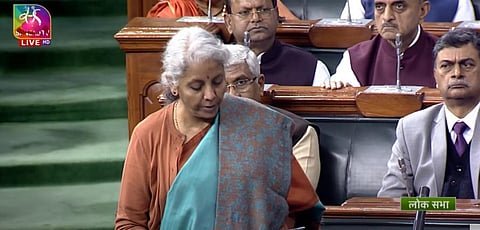

India's economy is projected to grow 6.5 per cent in 2023-24, compared to 7 per cent this fiscal and 8.7 per cent in 2021-22, according to India's Economic Survey (2022-23), which was tabled by Finance Minister Nirmala Sitharaman in the Lok Sabha on Tuesday.
The RBI's 6.8% inflation projection for the current fiscal is not high enough to deter private consumption nor is it low enough to weaken investment, Sitharaman said.
The minister also stated that India's recovery from the pandemic was relatively quick, and that the growth in the next fiscal would be supported by solid domestic demand, and a pick up in capital investment.
Read full text of Economic Survey HERE
India withstood an extraordinary set of challenges better than most economies, she said, adding that India's economic resilience has helped it withstand the challenge of mitigating external imbalances caused by the Russia-Ukraine conflict without losing growth momentum.
Speaking of the inflation problem, the minister said that it did not "creep too far above" the tolerance range compared to several advanced nations.
The Finance Minister warned that the challenge of rupee depreciation persists with the likelihood of further interest rate hikes by the US Fed. However, India has sufficient forex reserves to finance CAD and intervene in forex market to manage rupee volatility, she added.
The Economic Survey document, prepared by the Economic Division of the Department of Economic Affairs in the Ministry of Finance and formulated under the supervision of the chief economic adviser V Anantha Nageswaran, gives insights into the state of the economy and various indicators in the current financial year 2022-23 (April-March) and outlook for the next year.
Meanwhile, the International Monetary Fund (IMF) on Tuesday said it is expecting some slowdown in the Indian economy next fiscal year and projected the growth to 6.1 per cent from 6.8 per cent during the current fiscal ending March 31.
The IMF released the January update of its World Economic Outlook, according to which the global growth is projected to fall from an estimated 3.4 per cent in 2022 to 2.9 per cent in 2023, then rise to 3.1 per cent in 2024.
WATCH |
The Economic Survey tabled in 2022 projected India's GDP growth of 8.0-8.5 per cent in 2022-23, which the government felt will be supported by widespread vaccine coverage, gains from supply-side reforms and easing of regulations, robust export growth, and availability of fiscal space to ramp up capital spending.
The first economic survey reportedly came into existence in 1950-51, when it used to be a part of the budget documents. In the 1960s, it was separated from the Budget documents and presented a day prior to the Union Budget.
Budget 2023, to be presented on Wednesday, is likely to be the last full Budget of the Modi government in its second term with the next Lok Sabha election due in April-May of 2024.
The Budget documents will be available on the 'Union Budget Mobile App' on both the Android and Apple OS platforms after the completion of the Budget Speech by the Finance Minister.
President Droupadi Murmu had earlier addressed both Houses of Parliament earlier today. Tuesday is the first day of the Budget session of Parliament.
(With PTI inputs)